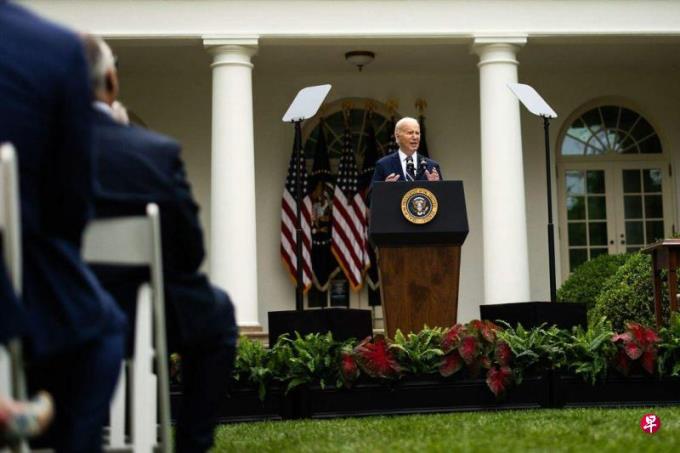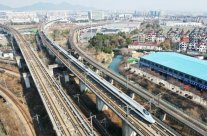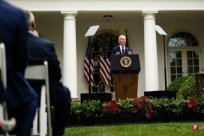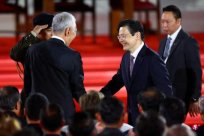
China vigorously develops new energy. Even if there are problems with specific methods, the contribution to the development of the new energy industry and the contribution of the climate crisis should not be denied, and enthusiasm should not be cracking down.
On May 14, the US Biden government announced a new tariff policy for China.Zero to 25%, increased to 0%to 100%.
The U.S. government's tariffs on China ’s this round is directly because China’ s excessive subsidies and dumping policies in China ’s trade in Sino -US trade.More fundamental is the intensification of economic competition in the United States and China.The European Union and European countries are also considering whether to introduce similar measures to the United States.
In the past 10 years, China has shown explosive growth trend in the development and production of new energy products such as solar/photovoltaic products, hydrogen energy development, and electric vehicles. Especially in recent years, China has not only become the world's largest new new.The production and exporter of energy products also occupy a new energy market in the world at a very low price.
China can quickly produce huge amounts of new energy products and quickly occupy the world market. Thanks to China's official support for the new energy industry, China's strong industrial production capacity, high subsidies, and cheap labor.This greatly reduces the production cost of Chinese products and improves competitiveness.
Other countries are either lacking technical capabilities and small production scale (such as other Asia -Africa and Latinos), or the cost of production is especially high (such as the United States and Europe), so it is defeated in competition with China.Therefore, the United States, Europe and other countries have sacrificed the "sprinkler" of a large increase in tariffs to curb the "siege" of China's new energy products in its country.The United States and Europe also accused China of adopting improper competition methods, such as new energy companies in national fiscal subsidies, and low prices to the United States and Europe at a low price.
Does the United States and Europe's accusations on China and tariff sanctions make sense?China's new energy and other industrial policies and models of industrial policies and models?Regardless of the United States and Europe or China, is it good or bad for internal and external economic and trade policies?This is quite complicated.
As an official long -term direct intervention in economic and industrial countries, China does have an act to support new energy industries such as fiscal subsidies and policy "green lights".Such a subsidy policy not only promotes industrial development and is conducive to centralized breakthroughs in key areas and large -scale production, but also violates the economic ethics of fair competition between enterprises and nationals in the market economy.Although other countries including the United States and Europe have also supported local companies, they are not as good as China, and the government has relatively limited participation.
China's official strong subsidy and administrative intervention in enterprises, although it promotes development in specific industries and increases output and employment. However, it also harms the autonomy of enterprises and free competition in the market, leading to the national economy too dependent on investment and exports.At the same time, China has rejected a welfare society, leading to insufficient consumption driving force.This makes China's economic growth model not healthy, sustainable and beneficial to the people.
The cheap and strict labor discipline, high intensity and long -term labor of China ’s labor force are also an important reason why“ Made in China ”spreading the world.In this regard, it improves production efficiency, provides high -quality products around the world, and promotes China's economic prosperity. However, it also harms the rights and benefits of Chinese workers and exacerbates the "inner rolls" of workers in China and global.Although labor has received a certain income in the specific orders, it has time to pay.In the long run, this model in China has seriously damaged the legitimate rights and interests of workers.
Subsidies are not necessarily beneficial to national interests
China ’s products based on subsidies and cheap labor have achieved the advantages of competing with other countries in the short term, but it is not based on the advantages of value, performance, innovation and other products itself.Equality and benign competition with cost -effectiveness.Even for the interests of Chinese countries and nationals, it may not be beneficial.The country's investment and subsidies to enterprises use the wealth of Chinese taxpayers, but corporate profits cannot include Chinese citizens.The low price of labor costs harm labor rights and interests, and it is also simple.
But this does not mean that Western accusations and tariff policies are completely legitimate.The sharp increase in tariffs this time is mainly targeted at new energy products such as solar panels and electric vehicles in China.However, one of the reasons for the development of new energy products in China is to accept the call for the development of new energy in Europe and the United States in recent years, fighting climate crisis, and the realization of human sustainable development.Today, China has vigorously developed new energy. Even if the motivation is complicated and there are problems with specific methods, the contribution to the development of the new energy industry and the confrontation of the climate crisis should not be denied, and the enthusiasm should not be cracking down.For excess Chinese products, countries in Europe and the United States should find ways to digest or transform them into tools that save resources, improve the environment, and curb the climate crisis, rather than let it rotten in factories and warehouses.
Chinese cheap labor production products, although they are suspected of improper and unhealthy competition, have also allowed consumers in the United States and Europe to enjoy extremely cheap products.Developed countries such as the United States, Europe, and South Korea, which have long enjoyed the international "scissors" upstream, have long lasted about 40 years because of the benefit of "Made in China".As a beneficiary, the United States and Europe should not only say that it is damaged in trade and avoid benefits.The United States and Europe cannot ignore consumers' rights to protect the interests of domestic producers."Gutty hurts farmers, Gu Gui hurts the people" (of course, the same is true for industrial product production and consumption), you must not take care of the other side.
High tariffs on foreign products, regardless of motivation, are ultimately a kind of trade protectionist behavior, which is not conducive to the free flow of economic globalization and production factors in the world.
In short, the United States and countries' high tariffs on China have both understandable and improper aspects.China's fiscal subsidy policies adopted by enterprises, especially state -owned enterprises, and models that lower labor prices, are mixed with advantages and disadvantages. In the short term, they can stimulate economic growth and employment. In the long run, it is not conducive to China's economy and people's livelihood, and it will also deteriorate the trade relationship with other countries.
If you want to change all kinds of improper and unfavorable economic and trade policies, countries such as the United States and Europe and China themselves need to make changes.For the United States and European countries, it is necessary to properly counter Chinese low -cost dumping in China, but it should also be affirmed that China ’s contribution to the development of new energy fields and in counter -dumping to avoid creating new trade injustice and barriers.The United States and Europe should also strive to promote the equality and inclusive international trade, so that the revenue of the nationals of developing countries will gradually move closer to developed countries.This is not only good for developing countries, but also reduces cheap production and dumping of the latter -developed countries.
For China, we must adhere to the development of new energy sources, but we should not achieve competitive advantages such as investing money subsidies, investment without cost yield ratio, and low cost reasons for cheap labor.Sex, encourage innovation and creation, win with quality.China also pays special attention to labor rights, improves workers' treatment and improves the guarantee mechanism, and should no longer rely on a model that has greatly lowered labor costs before.This is not only conducive to promoting labor rights and interests, but also to enhance national consumption capabilities, stimulate the economy, realize a virtuous circle of economy, rational competition to the outside world, make China's prosperity more inclusive and persistent, but also improve economic and trade relations with other countries.
Of course, the author also knows that these truths are easy and difficult to do.Because the economic and trade policies of various countries involve the interests of all parties.The vested interests and specific interest groups can adopt the existing policy of thin people, fat, and self -interest, and they are reluctant to reform and inclusive parties.For the reason why the Sino -US trade conflict is more fundamentally, the competition and confrontation between China and the United States, the fundamental differences involving the system, interests, and positions of the two parties, and it is difficult to resolve disputes.
But the author still hopes that whether it is in the United States and Europe or China, it is even more in the form of economic and trade policiesLiving people's livelihood, pay more attention to balance and coordination, and emphasize sustainability, rather than short -term and local interests, regardless of cost investment, destroying competition rules, and building high walls.The two countries should also be in need of the same depository and control conflicts, resolve disputes within the scope of the laws of contemporary international traffic, and avoid the tragedy path of falling into the new Cold War or even more intense conflict.
The author is a writer and international political researcher




